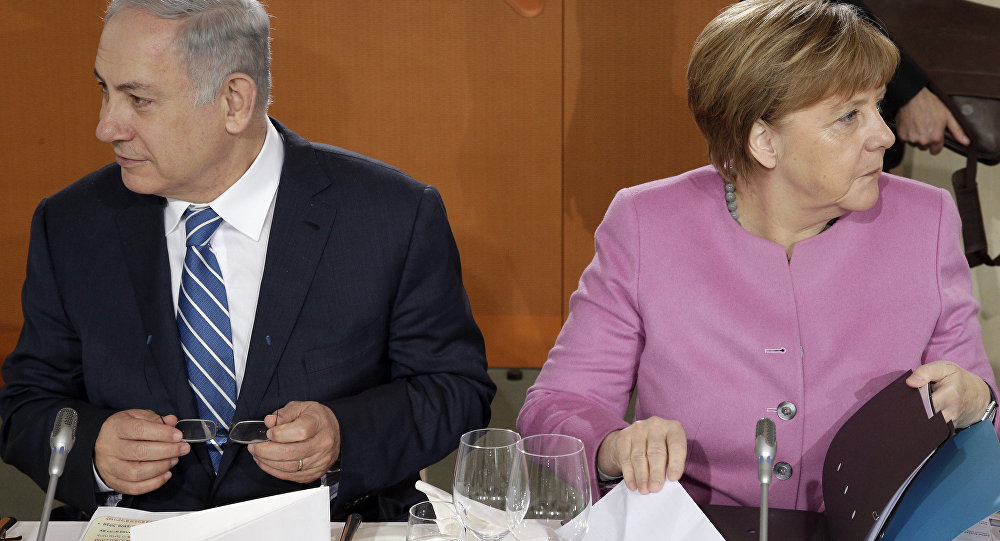European leaders would significantly benefit if they oppose Washington’s sanctions
Jun 8 2018 / 1:00 pm
European leaders would significantly benefit if they oppose Washington’s sanctions, re-imposed following Donald Trump’s withdrawal from the Iran nuclear deal, former CIA officer Philip Giraldi told Sputnik, commenting on Israeli Prime Minister Benjamin Netanyahu’s recent European tour.
Israeli Prime Minister Benjamin Netanyahu is striving to persuade European leaders to turn their back on the Iran nuclear accords; Philip Giraldi, a former CIA case officer and US Army intelligence officer, outlines three reasons why Netanyahu’s mission was doomed from the outset.
“Israeli Prime Minister Benjamin Netanyahu is off to Europe on one of his regular charm offensives, seeking to convince European heads of state that Iran poses a threat not only to the Middle East but also to Europe and the world due to its development of ballistic missiles and because it has a secret nuclear weapons program,” Giraldi told Sputnik, highlighting that, for its part, Israel has both ballistic missiles and nuclear arms.
While Israel’s nuclear arsenal reportedly numbers some 200 weapons, Tel Aviv remains “a non-signatory to the United Nations Nuclear-Non Proliferation Treaty, which Iran has signed,” he highlighted.
Furthermore, “Iran is also still participating in the Joint Comprehensive Plan of Action (JCPOA), which the United States has at least temporarily withdrawn from,” the CIA veteran underscored.
According to Giraldi, Netanyahu’s charm offensive will be unsuccessfulfor several reasons.
“First is the recent slaughter of Gazans carried out by the Israeli Army, which has poisoned the thinking about Israel among Europeans,” the former intelligence official said. “Their governments will not be inclined to side with Netanyahu on any issue.”
“Second, Europe, if it acts boldly in defiance of possible US sanctions, is poised to reap significant benefits in trade and business agreements with Iran,” he opined.
And, third, Netanyahu’s claims bear no relation to reality, Giraldi says.
“Iran is not even a serious threat in its own neighborhood. It has no nuclear program and its ballistic missiles, still under development, are designed for regional defense and response, not for offensive action. It is Israel that threatens Iran, not vice versa, and the Europeans understand that very clearly,” the CIA veteran concluded.
On June 4 the Israeli prime minister held a meeting with German Chancellor Angela Merkel.
During a joint press conference, Merkel made it clear that Berlin would remain committed to the Iran nuclear deal, as it prevents Tehran from developing nuclear weapons. She also said that Germany supports a two-state solution which envisages the peaceful co-existence of Israel and a Palestinian state.
She also referred to international agreements preventing the transfer of the Israeli capital to Jerusalem.
However, Merkel agreed with Netanyahu about the necessity of Iran’s pullout from Syria.
“There’s not agreement on every issue, but we’re friends and there’s a will to understand the other’s position,” the German chancellor said, as quoted by Deutsche Welle.
Likewise, on June 5, French President Emmanuel Macron told reporters during a joint press conference with the Israeli prime minister that Paris would continue to implement the JCPOA.
Citing the recent turmoil in the Palestinian territories, Macron expressed “condemnation of any form of violence toward civilians and in particular, these past few weeks in Gaza.”
UK Prime Minister Theresa May joined the chorus of European leaders on June 6 by telling her Israeli counterpart that London “ha[s] been concerned about the loss of Palestinian lives.” May reiterated the UK’s earlier vow to continue to support the Iran nuclear accords reached in 2015.
The recent wave of Palestinian protests in Gaza, the “Great March of Return,” kicked off on March 30, 2018. The demonstration was supported and endorsed by Hamas, a militant organization. Violent clashes peaked on 14-15 May, which coincided with the 70th anniversary of the foundation of the Israeli state and the Nakba Day (“Day of the Catastrophe”) generally commemorated by the Palestinians on May 15. According to some estimates, 110 Palestinians were killed by Israeli military forces between March 30 and May 15, while thousands were injured in the violent clashes.

